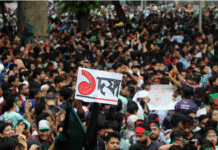Parvez Babul
Though Bangladesh has made substantial progress in some areas of health sector, food security and nutrition issues warn us to work comprehensively to adequately feed the hungry. Poor women and children suffer more from food insecurity and malnutrition. A dissemination meeting, titled, ‘Reenergising Nutrition Expanding Worldwide’ held in Dhaka on January 20, 2013 revealed that fifty thousand children die of malnutrition every year in Bangladesh for lack of adequate planning in the health sector.
A study report, titled, ‘State of Food Security and Nutrition in Bangladesh 2011′ presents a sorrowful picture that more than 60 per cent women in Bangladesh consume diets, which do not provide adequate micro- and/or macro-nutrients. The study report further observes that at times of household food scarcity, women and girls reduce consumption at a much higher rate than men and boys do.
Due to the continued effect of rapid increase in rice prices that began in late 2009, 2011 was an atypical year for Bangladesh’s food security situation. The James P Grant School of Public Health, BRAC University, Helen Keller International-Bangladesh and Bangladesh Bureau of Statistics, the implementing partners of the Food Security and Nutritional Surveillance Project (FSNSP), conducted the national study and launched its report through a stakeholders’ meeting on January 21, 2013. European Union provided financial support to implement this project.
In fact, woman and child nutrition issue has a close a relationship with the women’s empowerment and balanced distribution of food in the households. In another workshop held in the capital on January 16, 2013, the International Food Policy Research Institute pointed out that a large proportion of women are disempowered relative to men within their households. Inadequate control of resources, lack of decision making power in production and weak leadership in the community are major factors contributing to lack of women’s empowerment. However, policymakers must take into account regional differences in factors contributing to lack of empowerment of women. Different programmes and policies will need to be put in place to empower men and women alike.
FSNSP report further mentions that 12 per cent of children are wasted (weight-for-height) meaning that about 4.8 million children suffer from acute malnutrition at some point during 2011; and 40 per cent children below five years of age are stunted (height-for-age) that means more than six million children. Bangladesh remains off track for the Millennium Development Goal one target of reducing children underweight. Nationally, 32 per cent of adolescent girls are of short stature for their ages; placing them at heightened risk of delivery complications and of having low birth weight babies. Similarly, Bangladesh Demographic and Health Survey report 2011 mentions that the rate of stunted children in Bangladesh is 41 per cent. The target is to reduce it to 38 per cent by 2016. Stunting of children is a big challenge in Bangladesh. Inequality exists in income, gender and food distribution in the households.
We need to learn from other countries; their knowledge and experiences are important for us. Civil society organisations need to identify gaps, and work for resource mobilisation. Changing food behavior is vital. Impacts of natural calamities and human-induced climate change contribute negatively in food security, nutrition and other health sectors.
The FSNSP report mentions, overweight is an escalating problem with more overweight than underweight nationally, and nearly half of adult women are overweight in urban areas. A Toronto University research publication has also observed that the number of obese people is rapidly increasing in many countries. Globally, there were about 200 million obese adults in 1995; by 2010, it rose to 475 million while another billion were classified as overweight. At the same time in many developing countries substantial numbers of people are underweight or have chronic energy deficiency. And they are vulnerable to infectious disease or respiratory problems.
Food security: an important determinant: Global food security index 2012 of the Economist Intelligence Unit mentions that food insecurity also threatens political stability. Studies show that lack of food is correlated with a substantial deterioration of democratic institutions in low-income countries, as well as a rise in communal violence, riots, human rights abuses and civil conflict. About the ‘State of food insecurity in the world 2012’, FAO observes that economic growth is necessary but not sufficient to accelerate reduction of hunger and malnutrition. It further added that economic and agricultural growth should be nutrition-sensitive. Growth needs to result in better nutritional outcomes through enhanced opportunities for the poor to diversify their diets; improved access to safe drinking water and sanitation; improved access to health services; better consumer awareness regarding adequate nutrition and child care practices; and targeted distribution of supplements in situations of acute micronutrient deficiencies.
A joint publication of the World Health Organisation and the UNICEF in 2012 ‘Countdown to 2015: Maternal newborn and child survival’, delineates that most countdown countries, including Bangladesh, face a severe nutrition crisis.
Under-nutrition contributes to more than a third of child deaths and to at least a fifth of maternal deaths. In the majority of countdown countries, more than a third of children are stunted; stunting is most common among poor children.
UN Secretary General Ban Ki- moon, in a press conference in 2012 appropriately said, “870 million people are under-nourished. In our world of plenty, no one should live in hunger. No child should have his growth stunted by malnutrition. No child should have her opportunity for a better life curtailed even before she is born, because her mother was undernourished.”
United Nations’ Subcommittee on Nutrition published the ‘6th report on the word nutrition situation of 2012’. It highlighted the regional trends, maternal nutrition and nutrition security. It depicted that the proportion of undernourished people in the world began increasing in 2004, three years before the food and financial crises started in 2007. Thus the crisis did not create the current situation but rather significantly worsened an already existing problem. So, there is an urgent need for strengthening nutrition governance in countries, regions and globally to create an enabling policy and institutional environment for accelerated progress. Appropriate nutrition governance mechanisms should take the form of broad-based partnerships gathered in multi-stakeholder platforms that convene and provide the political space for all key nutrition stakeholders to be able to speak and be heard, to take joint decisions and reach agreements on concrete ways to develop capacities for country-led responses to malnutrition in a sustainable way. Special attention should be given to four elements that good governance mechanisms should address: 1) leadership and stewardship, 2) development of existing in-country capacities, 3) strengthening service delivery systems and 4) sufficient, adequate and appropriate financing. These must be including, as FSNSP report highlighted, country-led plans; comprehensiveness (food availability, food access and food utilisation); coordination among ministries and their departments, civil society and NGOs; increased and secured financing. Obviously the media should be involved as one of the stakeholders to get information and to know the reality of discrimination, deprivation and inequalities of poor women and children from their basic rights of food, nutrition, health services and others.
Source: Financial Express










An excellent article with significant policy implications. The article illustrates that despite Bangladesh’s remarkable economic and social progress achieved in recent years major challenges with regard to malnutrition and food security remain and that caused by a process of disempowerment especially at the houseold level the Bangladeshi women who have progressed in some aspects regressed nutritionally.
Our media should be engaging more and more on issues that are of vital importance to the nation. These sort of evidence based articles help all governments, regardless of who they are, to advance the cause of the nation in a more objective and apolitical manner.
I congratulate the author and the Financial Express for publishing this well researched and significantly educational article that hopefully, would advance further policy discourses on the issues that have been raised and options explored.
This article is a synopsis of an important study which must be heeded to by concerned people. It is scary to note that 50,000 children die of malnutrition in Bangladesh alone just for lack of proper planning. I think the media can play an important role in creating interest in all concerned parties to come up with a sound planning. In one place in his article the author stated that:…”policymakers must take into account regional differences in factors contributing to lack of empowerment of women….” It is not clear to me what regional difference must be settled. I hope that a national-level discussion must be initiated to resolve all differences.
I am so pleased that the author has placed a gist of important research findings for his readers. So, now it is upto the concerned parties to come up with a solution.